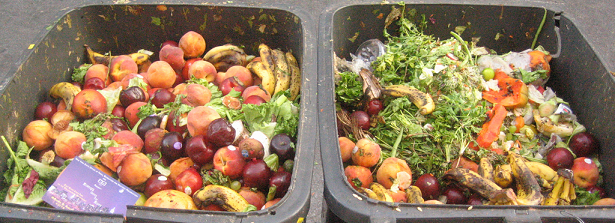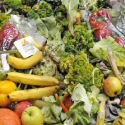F&BKP Report “Reducing food wastage, improving food security?”

Within the F&BKP an inventory study on the relation between the reduction of food wastage and the improvement of food security has been conducted. Please find below the link to the full report and the summary of the study “Reducing food wastage, improving food security?”.
Download the F&BKP Report “Reducing food wastage, improving food security?” (PDF)
Summary of the study
This study is concerned with the relation between food wastage reduction and the improvement of food security. By food security we mean that all people, at all times, have physical and economic access to sufficient, safe and nutritious food that meets their dietary needs and food preferences for an active and healthy life. This food security has a global and long term element to it (9 billion people to feed in 2050) and can be targeted at national, local and even individual level.
In recent years, food waste and food loss (together called food wastage in this study) have become high on the agenda of policy makers, researchers, business and civil society organisations. Many of those actors claim a positive relation between the reduction of food wastage and eliminating hunger and malnutrition. However, what is known on the link between those two factors?
As a result, the central question of this inventory study is to what extent interventions to reduce food wastage are effective contributions for food security, in particular for local access in developing regions, but also the food system stability in general?
To investigate this, an overview of international actors working in the field of wastage has been made, with a European/Dutch focus. Their activities and motivations and their assumptions on the relation between reducing food wastage and increasing food security have been mapped. Following this, a synthesis of insights on this relation from scientific and grey literature was made. Finally, conclusions were drawn up.
Results
A first, large group of active global, European and Dutch actors make implicit statements on the relation between food wastage in Western and low- and middle-income countries and food security, suggesting a link, but without explicitly explaining how one issue affects the other.
A second group of actors tries to deliver a more direct impact on food security by contributing to reducing pre- and post-harvest food loss in value chains in developing countries, for example with technological solutions in agro-logistics.
Literature shows that some food wastage interventions can have a direct impact on short-term food security conditions, in particular availability of food, but this depends on the circumstances. Nevertheless, the more direct effect of reducing waste in Western countries on food supplies, livelihood and food prices, in particular in developing countries, is less clear.
A third group of actors focuses on reducing waste on the consumer side of the supply chain in developed countries. Their aim is to make an indirect and long term impact on food security by creating a more efficient food system in environmental or economic terms.
Indeed there seems to be plausible evidence in the literature that suggests reducing and reusing wastage may have a positive impact on long-term food security through the efficient use of resources and environmental impacts.
Here it should be noted that in spite of the popularity of food wastage interventions in policy circles, the number of studies and documents on the relationship between food wastage interventions and food security has been found to be relatively small. Also the evidence for the relation is rather implicit with often a lack of a sound empirical foundation. In particular, little evidence exists for pro-poor effects of reducing wastage.
However, consensus in the literature exists that possible positive outcomes for food security, in particular wider access to food, depend on the larger context in the value chain or food system. For example proper infrastructure, means of transport and market access are essential for wastage interventions to have more significant effects. Wastage interventions in themselves may not solve the underlying causes of food wastage, such as poor communication within value chains or poor marketing strategies.
Key messages
The main conclusion of this study is that reducing the wastage issue cannot be solved in a single stroke. Interventions, although important, often do not make a significant contribution on their own, but can do so when embedded in a broader and integrated value chain or food system approach with an eye on context specific circumstances.
The Dutch government is very aware of this and has set up cooperation between the Ministry of Foreign Affairs and the Ministry of Economic Affairs to enable such an integrated approach for post-harvest losses interventions based on the extensive Dutch expertise. Ideally, actions would be tailored to match local or national needs and demands with the wide array of policy instruments that are available based on a careful assessment of the specific context.
In addition the assumption that interventions to reduce pre- and post-harvest loss automatically contribute to food security, in particular for poor consumers, has been found not evident per se. It is recommended to pay, on a case-by-case basis, explicit attention to context specific food wastage interventions (e.g. by downscaling) and their impact on local food security.
With respect to activities to reduce waste in the West that often claim a direct link to food security in developing countries, this study concludes that these suggestions often cannot be lived up to.
The reduction of wastage, be it post-harvest, in the distribution or processing stage of the food chain, or at the consumer level, is not a bad thing, and will often contribute to general food security through positive effects on the environment. However, if one aims to improve access to food, in particular for the poor and over the short term, a more context specific and holistic value chain and food system approach is needed.
It is recommended that future research and policy, aimed at increasing food security in low- and middle-income countries, should not focus specifically on the reduction of wastage only. It should rather focus on integral context specific programmes to improve the effectiveness of value chains or food systems of which reducing food wastage could be part.






